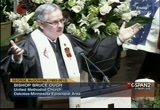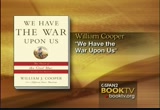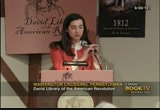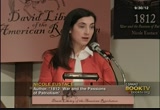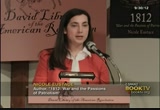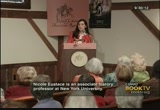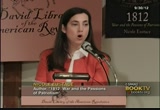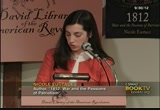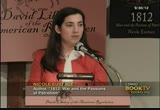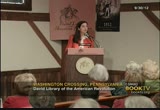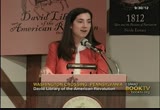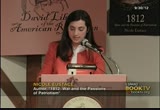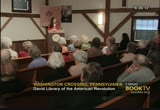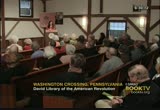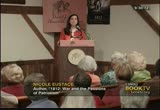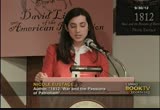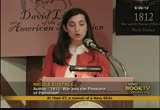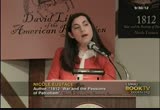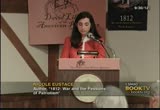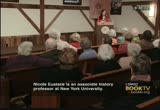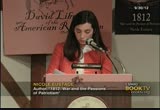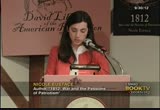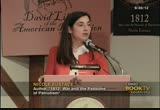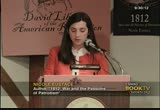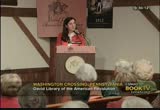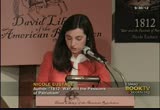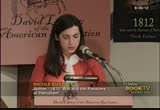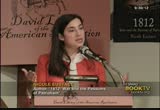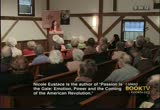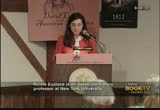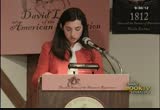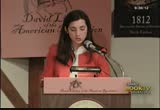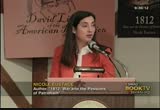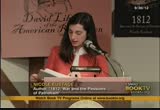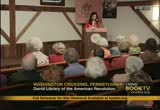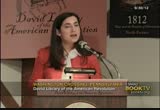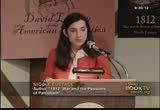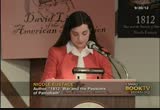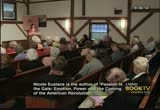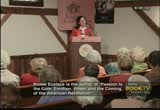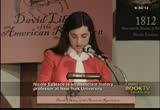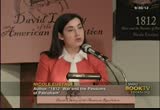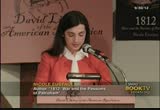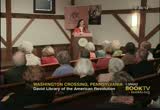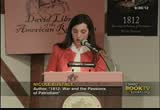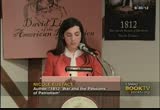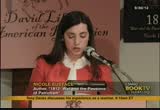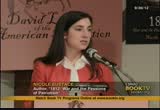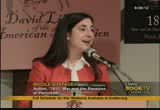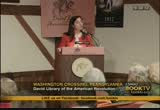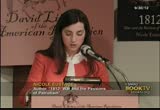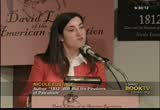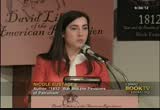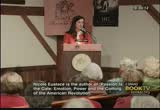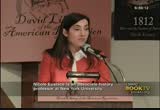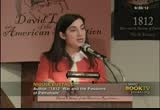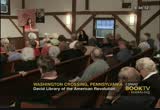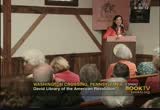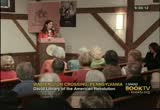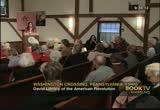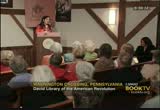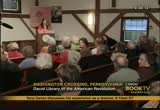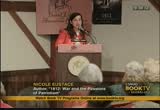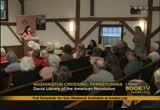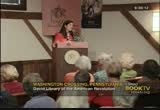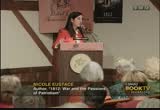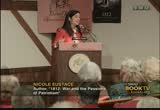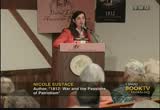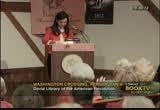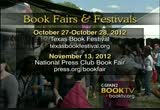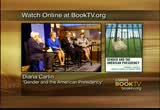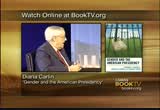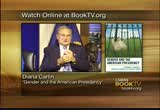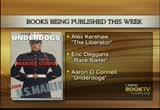tv Book TV CSPAN October 27, 2012 8:00am-9:15am EDT
8:00 am
stanley mcgovern in to his feet turn land everlasting arms, make you a complete in everything good and just so that you made to his will, so that you may go forth and do what you already know to do so that you may do what is pleasing in god's site through jesus christ to whom the glory forever and ever, amen. ..
8:01 am
8:02 am
culture in the new united states. on june 19th of 1812, james madison made a public announcement of the first war ever to be declared in the history of the united states. he said, quote, i exhort all the good people of the united states as they love their country, as they feel wrongs, that they exert themselves. madison's call made clear that the expectation of showing love of country required giving support to the war. at a moment of national crisis patriotism was needed. he sought to justify the conflict to the population at large and motivate the country to support the war. the stakes were high because although a majority in congress had voted in favor of declaring war not one single member of the federalist party had voted
8:03 am
in support of the war. northeastern federalists took a very skeptical view of the war, far more so than did southern and western members of the democratic republican party that madison was leading. ostensibly a conflict with britain over national sovereignty, the american war of 1812 very quickly became instead a test or and in addition a test of the strength and meaning of american patriotism. now, we often tend to forget about the war of 1812. it is easy to lose track of it between the glory are of revolutionary independence movement and karnage of the civil war. but the war of 1812 does enjoy a certain dubious distinction of its own and that is it was the first war to ever be formally declared in a modern democracy. in a democracy public
8:04 am
opinion matters. politicians gain and maintain power through the approval of the populace. in strict military and diplomatic terms the war of 1812 might have not have accomplished very much. by the end of the war the british burned washington, d.c. to the ground. the national debt nearly tripled from 45 million to a 127 million and all the united states had accomplished was getting the british to agree to maintain the status antebellum. that is keep all matters of diplomatic dispute exactly in the same status they had before the war. all territorial boundaries, all trade questions, everything going to just stay exactly the same yet somehow the population at large regarded this war with favor. the war received sort of a popular referendum in the presidential elections of
8:05 am
1812 and 1816. madison easily won re-election in november of 1812 in the early months of the war and his hand-picked successor and former secretary of war, james monroe, enjoyed landslide success four years later. hundreds of thousands of men cast votes for the democratic republican party in those contests. the war, in other words, proved to be a rousing popular success. how did people come to form their opinions about this war? well, usually not through direct observation. far many more people in the united states read and wrote about the war of 1812 than fought in it. i will just give you some numbers to get a sense of that the nation lost just 2260 men in battle in the war of 1812. that was less than one half of 1% of all servicemen.
8:06 am
many who served served in local militias and had a service that was more ceremonial than actual. by contrast 617,000 combatants died in the civil war just to give you a sense of the difference in scale we're talking about. statistics like these hint that the meaning of the war of 1812 can be found as much in popular prints, in newspapers, books and ballads telling about the war as it can be found in the battlefields themselves. contrast those numbers of servicemen with fwhum members on newspapers. between 1812 and 1815 the nation's presses produced approximately 250 different newspaper titles, from the south carolina state gazette to the kentucky telegraph to the massachusetts weekly
8:07 am
messenger. that is one newspaper franchise for every 10 men who died in battle. we're not talking about how many volumes of the newspapers were published weekly or monthly during that period. how many issues of each volume. we're talking about how many actual difficult newspaper franchises there were, quite a few. so if we truly want to assess the impact and the importance of world war -- excuse me of the war of 1812, i don't know where that came from, we need to evaluate it as a cultural event as much as a military one. now in 1812 americans took instructions about patriotism from a flood of popular prints, awash in discussions about national love. from political speeches like madison's to tavern ballads and folk songs, from learned treatises of political economy to popular novels and plays, americans on every side of the war question proved eager to talk about love of country.
8:08 am
a war that might easily have been dismissed as a terrific waste of time and money, if not deplored as a disasterous display of hubris. instead, sparked what one newspaper famously described as an era of good feelings. as madison's claim on those who loved their country and felt her wrongs made clear, emotion became central to the war's appraisal. everything was to be contemplated but the lens of patriotic love. throughout the war of 1812 popular conclusions about the meaning of events were liable to be based more on the emotional language used to describe them than on rational appraisal what had occurred. while europeans continued to declare their love of country grew out of child like deeggs veries to sovereign kings and american sons of liberty fought
8:09 am
revolutions from monarchs from what they called brotherly love, americans of 1812 emphasized their patriotism grew from another variety of familial affection, the romantic love of courting couples. consider the songsters who raised their voices in chorus in a ballad called, the love of country that appeared in a publication called the national song book of 1813. the lyrics explained a soldier is a gentleman. his honor is his life and they he that won't stand it his post will never stand by his wife since love and honor are the same or are so near allied, that neither can exist alone but flourish side by side. then farewell, sweethearts for a while. bid pretty girls adieu, when he drove the british dogs, we'll kiss it out with you. there you have the title of
8:10 am
my talk, love and honor with that promise that love and honor are the same, men and women alike were told there was a fundamental connection betweena+s romantic attachments and national loyalties. lovers made the best soldiers and vice versa, soldiers made the best lovers. in the era of the war of 1812 war stories and love stories were seriously intertwined so much so that to us it now seems humerous. the links between war and romance were literal as well as figure a tiff. the patriotism we might sum up as love, marriage and the baby carriage had a practical effect that was to foster spectacular population expansion. high rates of marriage and reproduction resulted in the exponential growth of the american population and this has significant implications for the nation's success in
8:11 am
military contests, not only with the british but also with native americans. in an age when starting a family usually meant clearing a farm, enhancements in the size of the population and expansion of the territory of the nation went hand in hand. in fact although the united states won no changes in british policy as a result of the war the country did gain undisputed control of western lands that had once been claimed by indians. these were land that would soon be settled by whites and cultivated in substantial part by enslaved men and women. now what this means is that all members of the nation's populace, no matter their civic status, no matter whether they could vote for against a president, could assist in the process of settling and thereby securing the nation's lands. it was no casual choice of words then when madison did not call on all the nation's
8:12 am
citizens to support their country. instead he called far more broadly to quote, all the good people of the united states as they loved their country to exert themselves. those loving people included the nation's entire population, male or female, slave or free, ex-concluding only the indian inhabitants of the continent who continued to struggle their their own sovereignty. what i woo like to do in the time we have together today try to bring the to life for you the power of and rhetoric of romantic patriotism by presenting two contrasting episodes of the war. one of a general who disdained the worth of emotional rhetoric only to suffer military catastrophe and personal ruin. the other, who embraced romantic patriotism. and in the process became the most celebrated military leader of the war of 1812 and a future american
8:13 am
president. i'm referring as you no doubt have guessed if you know war history at all, to the opening drama of the conflict when general william holt failed utterly in an attempt to claim the conquest of canada, and, to the war's epic conclusion when general andrew jackson achieved a spectacular triumph at new orleans. as we will see, the language of love proved pivotal to the public narration of these events. win or lose americans found their imaginations captured whenever battle sagas were replayed as love stories. no matter how dire the events of the day pro-war commentators could always be counted onto a put a romantic gloss on public events. the war of 1812 provided an ideal moment for americans from anonymous unknowns like the author of that soldier's ballad to leading national statesman, to mold the meaning of love of country.
8:14 am
war supporters worked to portray the conflict as a romantic adventure, one in which dashing young men went to war and won the hearts of patriotic maidens and one which the thrill of romantic love contributed directly to the glow of victory. now before i take you on this unconventional cultural chronology of the war i do want to first pause to take a can careful look at the contrary theories of political economy. you're going to have to bear with me for 10 minutes or some i promise we'll get back to soldiers and love songs but we can't appreciate the real significance of this rhetoric of romantic patriotism unless we have a good grasp on serious scientific thinking that lay behind it. in formal theory, freedom to love, marry and reproduce became essential elements of both american liberty and american power. now americans in the era of
8:15 am
1812 were themselves actually very belle versed in population theory. regular methodical government counts of all the country's inhabitants meant even average people had access to the basic facts of the nation's population strength. from the time of the first national census in 1790 to the second which was in 1800, the nation's numbers expanded from approximately 3.9 million to about 5.3 million. and they continued rising sharply, reaching 7.2 million by the third official census in 1810. so in total, the nation's numbers encreased nearly twofold in just two decades. these official figures were reported widely in regional and local newspapers as soon as the returns came in. complete census reports were printed sometimes in kind of commemorative editions with county by county compilations and made
8:16 am
available for public purchase. census numbers also featured in most standard almanacs just kind of basic information even ordinary farm folk wanted to have at their fingertips. there was a lot of attention paid to population and a lot of national pride based on the growth of the nation's numbers. but despite the satisfaction that americans took in their robust population, the nation's strength in numbers left it vulnerable to a critique of morals. throughout the first quarter century of u.s. independence britain's and americans had chased each other about questions about population, its regulation, its limitation, its optimization. even as white americans claimed to need enslaved americans and african-americans to their labor force they coveted indian lands to cover the nation's people. british interfered with and criticized u.s. plans on both counts.
8:17 am
on the continent british continued to cultivate diplomatic and economic ties to native americans supporting the rival population from who the united states perceived the greatest threat. on the ocean britain controlled atlantic shipping forbidding the atlantic slave trade after 1807 and harassing u.s. merchant vessels. meanwhile at sea britain's traditional goal of population limitation because usually british it fought on their small aisle, their main worry was too many worry but on the seas the royal navy needed every hand it could find on deck. the consequent british practice of boarding american ships to round up having a bound british seamen provoked enormous controversy more so because the efforts could at times sweep americans into british it nets. in the midst of such moral and political confusion both americans and the british made scattershot efforts to maintain the better claim to virtue. the rising crisis with
8:18 am
britain in the early years of the 1800s compounded every element of the promise rapped the problems of population in the united states. americans faced a especially important intellectual academic adversary in the form of the british theorist. thomas malfac . he was author of a book you probably heard of essay on the principlep population. you may not know its subtitle. it was an inquiry into our prospects respecting the future removal or mitigation of the evils that it occasions. it was first published in the england in 1798 and it was reprinted in the united states in a local edition by 18 owe 3. malpass offered his model of population not as scientific extraction but as concrete analysis of american geopolitics. viewing overpopulation as
8:19 am
the main cause of famine and suffering, he was an ainge gli can clergyman sin terded reproduction was one of the main moral evils. he argued the best way to restrict runaway population growth was young men and women to delay marriage. think cospend a few more years celibate in a single state before they started raising families. that would reduce the final number of children born to any given married couple and diminish the overall average size of families within the country. the chief object of his analysis was the rapidly expanding the united states. taking a hard look at u.s. ambitions to exert ever greater control over the continent of north america, malpass concluded quote, if america continued increasing which she will certainly do
8:20 am
the indians will be driven further and further back into the country until the whole rice is ultimately ex-terminated. how could the united states claim to be the globe's strongest defender of freedom when it denied the basic right of survival to native americans? malpass declared, quote, the right of exterminating or driving to a corner where they must starve, even inhabitants of thinly peopled regions will be questioned in a moral view. he had good reason to be alarmed at u.s. population strength since the nation's numbers had been increasing at such a remarkable pace. with no european rivals to contend with with, nothing stood in the way of doubling of u.s. lands and redoubling of u.s. population, exempt the thousands of indians who continued to live on their native ground. the united states thus provided a perfect object lesson for his claims that excess population fueled territorial aggression.
8:21 am
in what many euro americans saw as a virtuous cycle but many native americans and their british allies saw as more of a vicious circle, the continent's wide open grounds supported demographic expansion even as the increasing u.s. population enabled the seizure and settlement of new lands. resulting divergence in british and american attitudes towards the merits of population significantly increased tensions between the two nations on the each of the war. thomas jefferson who was architect of the doubling nation's lands had mall thus's objections is in the form of that purchase. u.s. took formal possession 1803. exactly one month later on february 1st, 1804 jefferson
8:22 am
wrote a letter which he confessed to quote, giving leisure moments i do rarely find to perusal of malthus's work on population. though careful to acknowledge malthus's work of one of sound logic, jefferson insisted that the ending englishman's theories could not be applied to the united states. jefferson concluded to the contrary in america, immense extent of uncultivated and fertile land enables everyone who will labor to mary junck so you don't have to delay marriage in jefferson's america. you can marry young and raise a family of any size, quote, unquote. if malthus claimed that america's burgeoning population forced territorial expansion, jefferson inverted the logic i can. he asserted virtually limitless availability of american lands assured for practical purposes there could be no
8:23 am
such thing as excess population. jeff in jefferson's survey of situation the right to love and marriage and reproduce were fundamental liberties enjoyed in america and in his survey of the situation indians were just completely overlooked all together. like his predecessor in office, president james madison preferred to celebrate american population strength. the two presidents shared the perspective of their mutual wartime correspondence, the french bureaucrat people hour. people hour stressed that as jefferson wrote to nemour at the war's end in 1815, his fondest quote, hope for his country with the british vanquisheds the americans at last would be permitted to
8:24 am
proceed peaceably in making children in maturing and molding our national strength and resources. despite the fiction that lay at the base of this hope, that quote, making children could be a wholly peaceable process the official republican view that population was essential to american national strength became one of the most enduring legacies of the war. by the time that u.s.-british tensions reached the breaking point in 1812 americans reveled in the connections between population strength and territorial spread that malthus regarded to the contrary as a source of evil. furthermore americans argued that romantic love encouraged exactly the opposite of the tyranny and aggression predicted by malthus. on the contrary, they claimed that true political liberty required unlimited emotional freedom. and the most exalted emotion was romantic love. as the virginia plantation owner and american political
8:25 am
theorist john taylor explained it, malthus was quote, in favor of resorting to law for professing. malthus teaches us in the english system one must devote one part of the community to death by famine or else to the necessity of living above half their lives without after tech shuns. according to taylor england was offering its people a stark choice between mass starvation on the one hand, or marital delay, population limitation and emotional private vision on the other. taylor even went so far as to use opposition to malthus as a means of justifying slavery. he taxed malthus with improposing a kind of moral slavery on his followers than was worse than any kind of legal slavery. is malthus, quote, proposes to introduced a system of celibacy taylor asked, who could fail to notice the difference in point of
8:26 am
benevolence between indirect slavery to an absolute master, and direct slavery to an absolute master? in taylor's america even those subjected to quote, direct slavery to an absolute master retained the right to reproduce. in taylor's america then no matter all the other freedoms that were denied to enslaved people, including the right to legal marriage and indeed to own, quote, unquote, their own children, they nevertheless had rights to reproduce that were in danger in malthus's england. u.s. slaveholders then could boast that african-americans in bondage had greater basic liberties and privileges than supposedly free-born englishmen in malthus's britain, meanwhile white americans enjoyed natural rights to love and marriage that were impossible to imagine in the cramped english aisle. print was the key arena
8:27 am
where these ideas were spread. where public and private intersected. where personal behavior could be glossed with political meaning. malthus had wide exposure in american popular culture. there were local american reprints of his book. there were long excerpts of work reprinted in newspapers often times with critical commentary debating against him and casual comments were very common in books and broadsides. obviously i don't have time to go into detail here there is one i think funny and memorable american maxim that can kind of stand in for the general popular reaction. an author by the name of mason weems, may remember him as a awe author of a popular biography of george washington at the time was equally well-known for a book on marriage. he said, quote. i'm very clear that the buck skin heroes of our nation are made of at least as good stuff as any of the best of the beef-eating gentry on
8:28 am
the other side of the water. but, he said, being good soldiers wasn't enough. nothing could save the united states while the british could outnumber them 10 to one. quote, no, my friends, tis population, tis population alone that can save our bacon. if this wasn't explicit or witty enough as a motto, weems then went on to lay it on really thick telling quote, bachelors and maidens fair, if you truly love your country dear, marry and raise up soldiers might and main, len last you may at england, france and spain. weems made clear that population expansion offered the united states's firmest assurance of success over all rivals. by the time of madison's war message then, the people of the country had long been instructed that engaging in patriotic duty consisted
8:29 am
first and foremost in indulging in romantic pressure us is. the actual efficacy of those assumptions was about to be put to the test. so let's turn now from theory to practice and look at how war stories and love stories converged once the military contest actually got underway. throughout the spring and summer of early, of 1812, before the first action of the war began, newspapers across the nation relayed early reports of the emotional status of the army as if this was the best indicator of the war's prospects. various articles stated, for example, quote, that the troops are in fine spirits anxious to be led across to the enemy. or quote, that they were all in high spirits and we feel confident of success. or, quotes, the men move on with great spirit and a lack criminalty. the nation and its soldiers
8:30 am
made emotional preparations only for victory, but the first confrontation with the british ended in an utter debacle. in the event, general william hull surrendered 5,000 u.s. troops at detroit without firing a single shot. the country was not ownly shocked by this defeat but they were certain that emotional shortcomings must have been to blame. the question was, whose feelings had caused this national failure? surely neither the romantic patriots reading the newspapers nor those ardent fighters filling out the rank-and-file of the troops could be to blame? one man was held responsible for the disaster, general william hull. hauled before a court-martial he faced formal charges from quote treason against the united states, to quote, cowardice at and in the neighborhood of detroit to quote, neglect of duty and unofficer-like
8:31 am
conduct. where it really gets interesting when the court specifies what they mean by unofficer-like conduct. the formal charges against hull included the claim through his negligence, quote, the general ardor of the army incenseably abated. according to the court, maintaining emotional ardor in the fighting force was one of a general's most important duties. up ising up the scene at detroit the occurred held that quote, the northwestern army of the united states being then and there in fine spirits and eager to meet the approaching army in battle had been thwarted by a general willing to enter into a shameful capitulation. in short, the court charged soldiers who had once been in quote, fine spirits, had had their ardor incenseably abated. up until the war of 1812 william hull had enjoyed a
8:32 am
sterling reputation. he was a celebrated veteran of the american revolution. he was a popular governor of the michigan territory but his inability to match the emotional tenor of his times forever tarnished his status and it almost cost him his life. now, general hull approached his capital trial determined to try to keep the focus on the factual, not the emotional. in defending his decision to surrender he laid out for the tribunal a clear account of the monumental organizational problems that he faced. the nation had declared war with little to know prior preparation and hull faced severe shortages of men and materiel as a result. of course he also categorically denied he had ever shown cowardice taking what he viewed as a pragmatic action to save the lives of his otherwise doomed troops. he also emphatically disputed claims that emotional priming had any
8:33 am
useful effect on military preparedness. hull argued that the men quote, though they were very ardent and patriotic in their expressions had had no service. neither men nor officers had ever been tried. he went on to say, quote, it is not extraordinary that i should have felt some wont of confidence in these raw troops. hull insisted patriotic ardor was no substitute for armed effectiveness, no matter the emotional charges against him hull tried to steer the trial back to a clear-sighted accounting of a true challenges facing a nation who had gone to war with only the most limited military infrastructure. critics of the war which were legion amongst the federalists agreed completely with hull's decision that men who claim to feel great ardor before they had experienced any military action were mistaking shadow for substance, feeling for form.
8:34 am
across new england from the first days of the war to the last, calvinist clergymen and federalist war opponents railed against the role of ardent passions in creating public support for the war. according to federalist allied members of the new england clergymen who joined the fight out of feelings of ardor were acting out of delusion, responding like sheep to the promptings of sin. quote, i feel as an american love of the country of my nativity insisted pastor bailey of new castle, maine, in a sermon he preached on july 23rd, 1812, but he argued, quote, war proceeds from the worst passions of the human heart and tends greatly to inflame them. he went on to quote from james ford in the bible, demanding of assembled parishioners, from whence
8:35 am
from wars and fighting amongst you? do they not come from lusts which war in your members? federalists do not dispute there was a deep connection between the emotional and the marshal. but they insidded war passions stemmed from sinful lusts and thus deserved renunciation, not celebration. i want to be clear here. when new englanders in this era thought about lust as a term, they had quote carnal desire directly in mind. carnal desire, that is the definition for lust that was provided in the first-ever american authored dictionary, noah webster's american dictionary, which was published in 1806. to be quote, lustful, according to webster was to have quote, irregular desires. while to behave lust fully was to do something in a lustful or lecherous manner. despite all imputations of
8:36 am
sexual sin and deif yensy, webster also note to do something quote,lous fully, do it stealth stealth think, bold and with courage. actions between sexual arousal and courageous resolve were woven into the american vocabularily of english in the era of 1812. minute sisters opposed to passions found eager supporters amongst the parishioners. along with the formal sermons i'm talking about, printers circulated writing by ordinary people that took similar points of view. one antiwar poem as a broadside poster written by a man named william allen from newport, rhode island, rhymed, quote, war, carnage devastation, many fall in leaves died, in the sacred page we read all these from our lusts proceed.
8:37 am
so from formal sermons to sing songs war opponents easily accepted the association between violent actions and vial passions. biblical basis is claims that wars resulted from lust was accepted as common knowledge across new england. but among war supporters the very same equation was made to yield a very different solution. pro-war writers consistently asserted the existence of an essential connection between love and patriotism. intended by their very nature to stir the blood, songs meant to motivate action also encouraged people to purview -- pursue war as pleasure a little diddy called, on hobbies, for example, used the hobby horse to make explicit the equation between sex and soldiery and love and liberty and its rhymes are worth quoting at length. the song went like this. hobby of soldiers in time of great wars is breaches and
8:38 am
battles with blood, wound and scars, but in peace, you will observe, that quite different their trade is, in peace the hobby of soldiers is ladies. the ladies sweet creatures, yes, they now and then, get as stride of their hobbies too just like the men, with smiles and with sim pers beguile us with ease and we gallop and trot and am bell even just as they please. the americans hobbies has long since been known, no tyrant or king shall from them have a thrown. their states are united and let it be said, their hobby is liberty, peace and free trade. as these verses help enunciate when americans of the early republicans the sexual together with the marshal, the perils of war could be entirely eclipsed by erotic. such songs encouraged men and women alike to imagine national employments as personal enjoyments. the popularity of ardent
8:39 am
patriotism had important and widespread political implications. now broadly speaking these kinds of frisky war songs helped to undercut the tedious moral calculations of federalist war opponents. more specifically, the whole trials emphasis on emotion transformed the general's failure at detroit into something that was almost a boon for president madison. on november 4th of 1812, reflecting on the impact of hull's surrender at detroit and at the height of his re-election effort, madison declared, quote, the nation's spirit rises according to the pressure on it. the loss of an important post and the brave men surrendered with it inspired everywhere a new ardor and determination. days later of course he won his bid for re-election. when even the president relied first and foremost on the rise of ardor for the preservation of the nation
8:40 am
hull stood little chance ofing his case on basis of reasoned analysis alone. hull hardly bore sole responsibility for the military failure at detroit. there was systemic unpreparedness that he was tasked single-handedly with over coming. but his inability to understand the importance of making emotional appeals to the people in an age when print culture made public opinion matter as never before marked him as a man out of step with the times. in the end none of hull's protestations no matter how factual, could ultimately override the court's and the nation's embrace of the emotional. hull was handed a capital sentence by the court. now president madison ultimately reprepared the old general but only after the election had safely been won. claims that emotion mattered as much as accomplishment, indeed that patriotic love actually made an important public contribution, opened the way for inhabitants of
8:41 am
the country to imagine that their own private feelings could aid in public efforts. and since so few people could claim any kind of immediate experience of the war, the kind that had guided hull's decisions at detroit, romantic stories about the war and the ardor it inspired could easily sway public opinion about the conflict. now, let's turn to the close of the war and general andrew jackson. general andrew jackson proved to be the general william hull's antithesis in every way. if hull opened the war by exposing the nation to ignominious defeat, jackson closed it in a blaze of kblor that earned him lasting reyou noun. if hull claimed ardor without action accounted for nothing, jackson understood clearly that emotion could actually be both a successful prod to exertion and an effective proxy for it.
8:42 am
give me one second here. ahaha. i knew there was a bottle of water. all right. so let's talk a little bit about andrew jackson's triumph at new orleans and the nation's ultimate embrace of the rhetoric of patriotic romance. the most popular narrative portrayal of jackson's actions came from the pen of his friend and biographer john eaton. john eaton set out deliberately to elevate jackson in ways that invited direct comparisons to the fallen general william hull. whereas hull had given up more than 2000 prisoners, jackson inflicted over 2000 casualties. whereas hull, a hero of the american revolution, had preferred to be in command of a disciplined professional army, jackson proved himself capable of winning with a ragtag militia. most of all, while hull faced a capital trial for the way that he had allowed the ardor of his men to become incenseably abited,
8:43 am
eaton stressed repeatedly that jackson had risen to greatness through quote, the natural ardor of his temper and that in every campaign jackson was everywhere amongst his troops, quote, inspiring them with the ardor that animated his own boss some. when it came time to describe new orleans specifically eaton provided account of speech jackson made to his men that made absolutely clear the link between passionate arousal and patriotic action. eaton claimed jackson delivered his address with the definite goal of inspiring his men to quote, preserve their ard door and -- ardor and devotion to country. eaton's jackson exhorted quote, look to your liberty, your property, the hasty of your wives and daughters. jackson warned the men to beware that at their worst, british soldiers could inflict rape on american
8:44 am
women. now, this practice was totally unauthorized and it was not commonplace but there was one isolated, documented incidence of british atrocities in hampton, virginia. and jackson drew on that event in his speech. he urged quote, take a retrospect of the conduct of the british army at hampton and every bosom which glows with patriotism and virtue will be inspired. by directly invoking rape in the effort to prod his men to action, jackson advanced explicitly the idea that the war of 1812 was as much a fight against british sexual tyranny as a struggle for anymore positive definition of liberty. in fact jackson and eaton together helped spread around a wholly false story about english depravity at new orleans that did much to a rouse americans to patriotism in the aftermath
8:45 am
of the war. let's talk a little bit about the spread of this story. on february 16th, 1815, when the united states house of representatives met to devise an official congressional resolution of thanks to general jackson, gerald ingersoll, a republican from philadelphia, took to the floor and exclaimed, quote, for the first time during this long arduous and trying session we can all feel alike. we are all of one mind, all hearts leap up to the embraces of the other. why was ingersoll's heart leaping? well the fact of jackson's success in new orleans had been known for a week or so but ingersoll's excitement related to a new and juicy bit of gossip. he informed his colleagues that word had just arrived that on the occasion of the failed invasion of new orleans, british officers had offered quote, beauty and booty in other woods
8:46 am
words, rape as the reward of victory, end quote. ingersoll short telled, quote, thus led and thus invited the british army made its storm. their discomfort is without example. never has there been such disparity of loss. this shocking story electrified the capitol. the supposed decision of the british to authorize extreme measures had only produced the most extraordinary defeat. now, this story had no basis in fact. this is a point i investigate at length in my book. i actually trace the rumor to the source. it is quite an interesting story in itself. but this myth of beauty and booty sent exactly the message that american war boosters had always wanted to give. from the beginning the war of 1812 had been fought as a contest over the meaning and validity of american claims to champion liberty in an expansionist age. whereas british commentators
8:47 am
like malthus were trying to seize the moral high ground by critiquing american slavery and western expansion, the story of beauty and booty helped mire the british it in the muck of their own hypocrisy. as jackson's biographer eaton explained in his account of the battle which featured the story rather many prominently, quote, booty and beauty was the watchword of sir edward pack's army in the battle of the 8th. its criminality is increased from being the act of a people who hold themselves up to surrounding nations as examples of everything that is correct and proper. by tarring the british with accusations of sexual depravity americans could promote themselves as the last guardians of an essential element of virtue. conversely as eaton observed, the british it could no longer quote, hold themselves up as a civilized standard to which americans should aspire. so besides making great
8:48 am
gossip, the watchword scandal polish ared the u.s. image as a uniquely virtuous nation, bent on preserving the most fundamental form of liberty, sexual consent, from british it abuse. each person who repeated the story of beauty and booty helped validate assertionings american men fought for country because of romantic love they felt for wives and sweethearts and because of their determination to offer their women effective protection. in doing so, u.s. soldiers enacted a love of liberty that was entirely different from british tyranny. throughout 1815 cities and towns across the nation threw festive dinners and dances in honor of andrew jackson and he attend many of these on sort of a victory tour. men and women alike gathered to celebrate the coming of peace and to repeat the patriotic myth how general jackson had saved the women of the country from certain rape. in georgetown in december of
8:49 am
1815, for example, sell brants offered a toast urging quote, feelings of patriotism of duty opposed to watchword of beauty and booty. jackson obligingly raised his glass with the rest. this myth soon became woven into the national fabric. a popular song called, the hunters of kentucky, rhymed quote, you've heard i suppose how new orleans is famed for wealth and beauty. there's girls of every hue it seems from snowy white to suitty. packing ham he made his brags if he invite was lucky he would have their girls and cotton bags in spite of old kentucky. now, interestingly, as this song hints, the story of beauty and booty showed white men and black men of new orleans fighting side by side to protect women of quote, every hue from gang style attacks by british forces.
8:50 am
contraries celebrated black contributions to jackson's victory and made explicit claims that the british planned to target black and white wem alike for the assault. the song closed by boasting that the british took to flight and left us all the beauty and scourned efeet antiwar new englanders by saying send for us kentucky boys and we'll protect you ladies. the song was soon print in the broadside form all across the country. the real beauty of the story of beauty and booty as it became elaborated it helped men from leading politicians to family pay tri a that mass rape was the mark of true tyranny. men could claim outright freedom in love was both the root and fruit of every other kind of liberty. with neat circular logic as falling in love and beginning wedded life became patriotic duties the right to procreate in turn defined
8:51 am
the essence of freedom. in this context even those with no formal voice in government could be asked to lend their weight to the national effort. maximizing the number of people who could be mustered for the country, meant relaxing barriers to public participations, finding new ways to inspire loyalty to the land, encouraging reproduction. with a stress of war making every person's contribution count, personal feelings and patriotic feats became connected in new ways. whereas general william hull had claimed that emotion without accomplishment mattered for nothing, andrew jackson proved him wrong. jackson's stirring victory at new orleans occurred two full weeks after the united states and great britain had signed a peace treaty. the peace treaty as we already said simply returned all matters in dispute to the status quo antebellum. so in real terms, jackson's remarkable feat mattered not
8:52 am
at all. but in symbolic ones, the battle of new orleans would become a defining moment for the nation. this alchemy occurred through the power of patriotic popular print culture. gossip about the british watchword scandal invoked just the kind of ardent yearning sure to stir action. to hasten the federalist's party's extinction, to cement national devotion, to augment population and to motivate continuing territorial expansion. now, this is not at all to say that jackson made no real or lasting military contributions. among other things he used the wartime opportunity to wrest 22 million acres of land in georgia and soon to be created state of alabama from the creek nation. the point instead is to notice that interest was love defended at new orleans, not death delivered at fort jackson, that earned andrew jackson enyou are doing
8:53 am
fame. so long as all inhabitants of the united states motivated by love for their families and love their their country supported the continued right of settlers to people new ground, particular military encounters mattered less than the general promotion of feeling. historians recently begun to appreciate that one new way to look at war of 1812 not only as the nation's first declared war against a foreign enemy and as a decisive moment in the course of ongoing indian conflicts but also as the nation's first civil war. the war of 1812 had divided the nation into splintered political factions but it ultimately united it around a new vision of patriotism. if this assessment of 1812 as an era of civil war is accurate, it must be significant that at the time it occur, the war was successfully portrayed as such good fun.
8:54 am
if war was a frolic and patriotism was the natural result of indulging romantic passions, who could ever have predicted the devastation of the civil war? likening a war to an exercise in love hardly prepared anyone to undertake a studied assessment of the moral implications of conflict. now the amazing thing is that the first major battle of the civil war, the battle of bull run, caught contemporaries completely by surprise. people actually brought out picnic hampers to watch the battle as spectators and to cheer the action, and they were shocked to the core by the carnage that day. 5,000 dead in a single day. more than all the years of the war of 1812. it is small wonder that a population reared on popular stories of war as pleasure had given so little thought to the real costs of armed conflict. in 1812 republicans had
8:55 am
discovered the unifying potential of making war support the measure of love of country, and of likening love of country to ordinary romantic affections. the nation would discover only too late the true price of false love. thank you. [applause] >> anyone would like to ask any questions? don't be shy. if you don't want to stand, raise your hand, ask from your seat. [inaudible] >> you talk about general jackson's victory in relate todd the end of the federalists. could you elaborate on that?
8:56 am
>> sure. he asked what is the connection between jackson's victory and, he said the end of the federalists. i should clarify, the federalist party continues to exist well after the war but it is much more prominent at a local level. it really does fade from national prominence after the war. and in great measure that's because of the as send dance of the men who contributed to the war effort. so we go straight from madison to monroe and into this so-called era of good feelings in which the nation as a whole really does rally around the republican party to unprecedented extent. >> what happens to the men that all surrendered? were they just disarm and sent home? did they become canadians.
8:57 am
did they go to the car industry? >> what happened to the men that hull surrenderedded? did they go home or did they go to the car industry. the car industry was definitely a couple centuries away. not a couple but one, one century away but, no, most of them were repatriated. there were furloughs and exchanges and hull himself was furloughed by the british it because they thought it would be to their strategic advantage to do so. of course he got home only to face a court-martial. that didn't work out quite so well for him. >> what is the canadian perspective for the war? [inaudible] >> the question is, what's the canadian perspective on the war of 1812? how is it taught up there? i should say i have no first-hand knowledge of this. i teach at nyu but i have been talking to canadian colleagues quite a bit this year on various panels and what i'm hearing is that in
8:58 am
canadians, this is really celebrated as the important war that made the canadian nation. that this might not have been a victory for either the united states or great britain but canada regards it as a victory for them. that if they turned back american invasion efforts that after the war of 1812, from then to now there has never been a cross-border conflict. >> i can confirm that. i'm an american who spent a good part of my youth in canada. went to school there and yes, it is very much at source of canadian pride that the americans were defeated. >> thank you for that. yes? >> i would like to go in australia and we had detailed history of the revolution, boston tea party, and so on. and then, of the american
8:59 am
civil war. we knew almost everything about that. we had battle of antietum and battle of gettysburg and so on. and when i came here in the 1957, i found i really knew a lot more about the revolution and the civil war than colleagues here, students, and academics. but we never heard a word about the war of 1812. it was not mentioned. and it was not in our history, any idea why that could be? >> he was educated in australia and there was quite a comprehensive education on the topic of the american revolution and the american civil war but almost nothing whatsoever on the war of 1812 and why might that be? well, the british i think did not tend to regard the american war of 1812 as a
9:00 am
particularly significant event at all. for the british it, this was just one small, kind of sideshow in the midst of a global war with napoleon. so for them the war of 1812 is the one happening on the european continent and around the globe. not the one happening in north america. that might have something to do with what is taught in australia. the fact of the matter it was not taught very much here either i think for some of the reasons that i outlined. if you look at this in military and diplomatic terms it didn't change very much for the united states. but i think it is worth taking a new look at it from a cultural perspective and thinking about what it means to declare war in a democracy and how you use popular culture to mobile public opinion. >> thank you. >> yes? >> seems to me the war came to an end rather abruptly even after the defeat of hull and before new orleans,
9:01 am
the peace treaty having been signed before the battle of new orleans. the british were winning. why was it ended so abruptly? . . one of the declared reasons for the war were the so-called british orders in council which had to do with interfering with american shipping lanes. the british actually defended
9:02 am
the war before the united states declared war but because of trans-atlantic delays in communication the u.s. didn't know it so by the time the war broke out the british have already conceded one of the major points the u.s. wanted action on. the british were never committed to this war but when the u.s. declared war they had to respond. it anything probably the peace treaty was a long time coming. >> very interesting talk. the 50th anniversary of the war of 1812 was 1862, the beginning of the civil war. i am wondering if the way the united states remembered the war of 1812, was in any way affected by the carnage. >> what is affected by the
9:03 am
carnage? just to clarify, there wasn't much carnage. the question would be -- >> the carnage of the civil war. >> that is the fascinating question. i think you gave me a new book. it would be really interesting to go back and looked. i think they may have been too preoccupied. 1812 commemoration was more prominent of the 76 anniversary. that is what i would say quickly but it is an interesting question. >> did we have a standing army at all in 1812 and how might that have changed? >> very small regular army at the outset of the war. it did change after the war.
9:04 am
they had a regular army. the lessons learned during the american revolution, there was a real fear of standing on these at the time because of experience with britain. people today don't realize in the eighteenth century, outstanding armies were standing in your house. the british when they stationed troops in boston's a were quartered in private people's homes like it or not so there was a real worry about the dangers of a standing army and that prevented the nation learning a lesson from the revolution which was having a well-trained, discipline, supplied fighting force is crucial to being the effective. that was washington's achievement, to put that in place by the end of the revolution. so when it started in summer of 1812, he had a small -- regular
9:05 am
troops, a few hundred compared to a few thousand militia men most of whom had never seen active service and were none too happy to be marched away from their homes hundreds of miles through the woods to the fourth at the fleet. the idea was miller show was the home guard. you were supposed to literally defend your local community and people were rightfully worried that if they marched off to serving battlefields they ever leaving their own home and hearth and defended. this is an untenable system that created a few problems on the ground in 1812. they were only finally surmounted at the battle of new orleans. recent history has actually shown that there were more regular troops and better ammunition in new orleans than popular myth had in 1850 but in
9:06 am
1815 what people were really celebrating was the idea that jackson had gone to battle with this total buckskin ragtag militia, ky boys and they finally succeeded in overcoming earlier militia problems. yes? >> the american navy had some influence in the war of 1812, finally got established and i am wondering if your theory on romantic passion had anything related to the navy because i thought sailors were more romantic than that. were there any stories like that? >> were sailors more romantic? , thank you for the question. i have a whole chapter on sailors in the book. figure out what you're going to abstracts allied didn't mention
9:07 am
the sailors but you are right. they are in the same patriotic that we have been talking about. >> was general hall's involvement in the revolution? >> he was an officer in the american revolution. quite successful. i can list individual battles of the top of my head. >> any questions [inaudible] >> a bookmark from that. thank you very much.
9:08 am
>> thank you for your questions. [applause] >> this program was hosted by the david library of the american revolution in washington crossing, pa.. for more information visit el elar.org. dlar.o dlar.org. >> douglas brinkley, many more. visit booktv.org for complete schedule of events. the national press club book fair and author night is november 13th and includes 90 writers and proceeds support the national press club journalism
9:09 am
institute. watch booktv in the future for interviews from this event. this year's national book award will be in new york city on november 14th. ceremony celebrates author's work of fiction, non-fiction, poetry and young adult literature. booktv will air the ceremony the following weekend. miami book fair international is held from november 11th through the eighteenth featuring three hundred fifty authors and booktv will be live from miami. november 17th and eighteenth. for complete schedule bader presentations interviews and more visible tv.org. please let us know about book fares and festivals and we will be happy to add them to our list. e-mail us at booktv@c-span.org. booktv is on facebook. like us to interact with booktv guest and viewers and get up-to-date information on events. facebook.com/booktv.
9:10 am
>> within the conference of doing so much, we went to democrats, republicans, different parts of the country, different ages. we the basis -- you can't make generalizations that are 100% certain and we say as much in the book. conclusions are hypotheses that other people might run with but in order to make even those kinds of hypotheses we needed a fairly diverse group of. >> we also included women, white house project has been around last couple election cycles and they have eight so several of the women of the white house projects identified several years before the 2008 election,
9:11 am
kathleen said delius, kathleen sibelius, barbirolli was here when you did the last round of figures with the foundation, talked-about looking at women governors. we talk about women governors who have been through training in the pipeline. >> we made the observation when a male is elected to senatorship he is cast as a presidential hopeful. scott brown hadn't even been sworn in yet in massachusetts and yet scottybrown2012.com was already searching but some of many women had been in washington for so many years as legislators and working on important work and yet their names never bubble to the top and we were curious why not. >> how did you decide you wanted
9:12 am
to write this book? you were citing similar topics but how does this book come about? >> it was my idea. i have been a political merde -- my parents remember my sister and i in 1960 staging a nixon/kennedy debate. my elephant beat her rabbit. during all those years, what always fascinated me were magazine issues that would come out in advance of presidential election that would preview the eighth or ten or 12 people who ought to be considered and it struck me after seeing so many issues and so many magazines that women were making it on to
9:13 am
that. they were not thought to be presidential. they were thought not to be presidential. as an academic you ask why? that for me was the origin of the book. >> you can watch this and other programs online at booktv.org. here's a look at some books being published this week. historian alex kerr shaw chronicles the story of felix sparks, commander of the 157th eager for duty in the liberator, one world war ii soldier's odyssey from the beaches of sicily to the gates of nassau. journalists and media critic eric deegan argues the media capitalizes on viewers fears and prejudicess to garner an audience in the race here:how the media wields dangerous words to divide a nation. in hundred dogs:the making of the modern marine corps, baron o'connell, a professor of the
9:14 am
cold war at the u.s. naval academy chronicles the transformation of the marine corps from world war ii to vietnam. you can see a recent interview on booktv.org. david, editor at large for tam magazine describes abraham lincoln's political decisions in the second year of the civil war in rise to greatness:abraham lincoln and america's most perilous year. in tombstone:the great chinese famine, 1958-1962, what led to the famine of the 1915s and 60s which included the death of his father. the creator of fractal geometry recounts his life in the fractali fractalist. gin of africa, recipients of the nobel prize of literature discuss africa's culture, religion, history and identity. look for these titles in bookstores this
122 Views
IN COLLECTIONS
CSPAN2 Television Archive
Television Archive  Television Archive News Search Service
Television Archive News Search Service 
Uploaded by TV Archive on

 Live Music Archive
Live Music Archive Librivox Free Audio
Librivox Free Audio Metropolitan Museum
Metropolitan Museum Cleveland Museum of Art
Cleveland Museum of Art Internet Arcade
Internet Arcade Console Living Room
Console Living Room Books to Borrow
Books to Borrow Open Library
Open Library TV News
TV News Understanding 9/11
Understanding 9/11